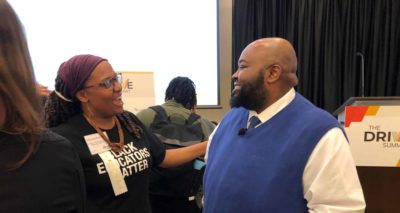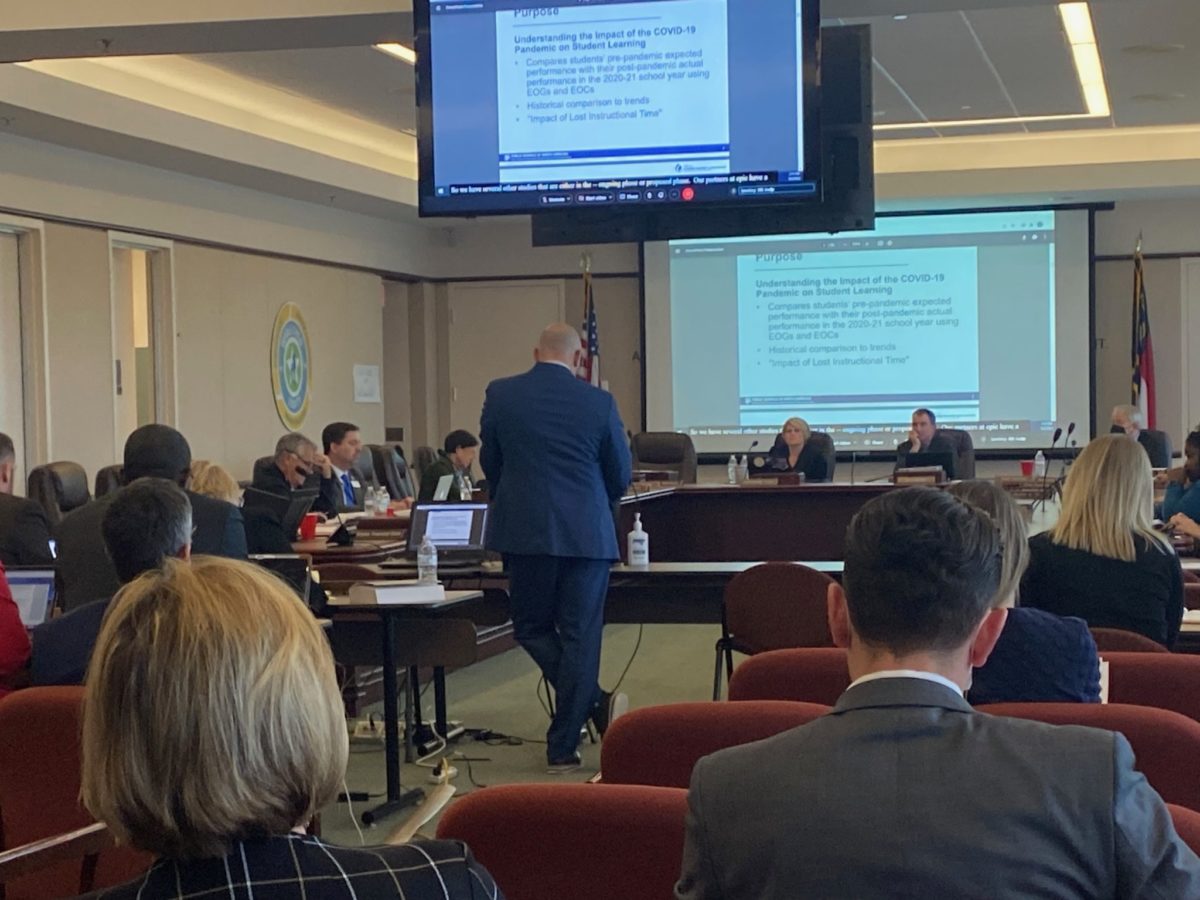
|
|
Updated March 4, 2022 at 9:01 a.m. to include a response from the state Department of Public Instruction on teacher vacancies.
The State Board of Education met this week and talked about a variety of things, including learning loss, the state of the teaching profession, and Board members’ concerns over the makeup of the state superintendent’s Parent Advisory Commission.
Gov. Roy Cooper’s DRIVE Task Force also met this week.
Sign up for the EdDaily to start each weekday with the top education news.
Are teachers leaving the profession?
A State of the Teaching Profession report presented to the Board on Wednesday suggested that fears about a mass resignation of teachers due to COVID-19 may have been overblown. The catch is that the report only covered last school year. And, while the number of teachers leaving the profession didn’t go up a whole lot, the number of vacancies reported by districts did.
In the slide below, you can see teacher attrition and mobility from 2017-18 to 2020-21. Attrition is when teachers leave the profession. Mobility is when they move between districts but stay in the profession. The percentage of teachers leaving the profession increased from 7.53% in 2019-20 to 8.20% in 2020-21. The percentage of teachers moving between districts, however, decreased from 4.94% to 2.96% over the same time period.
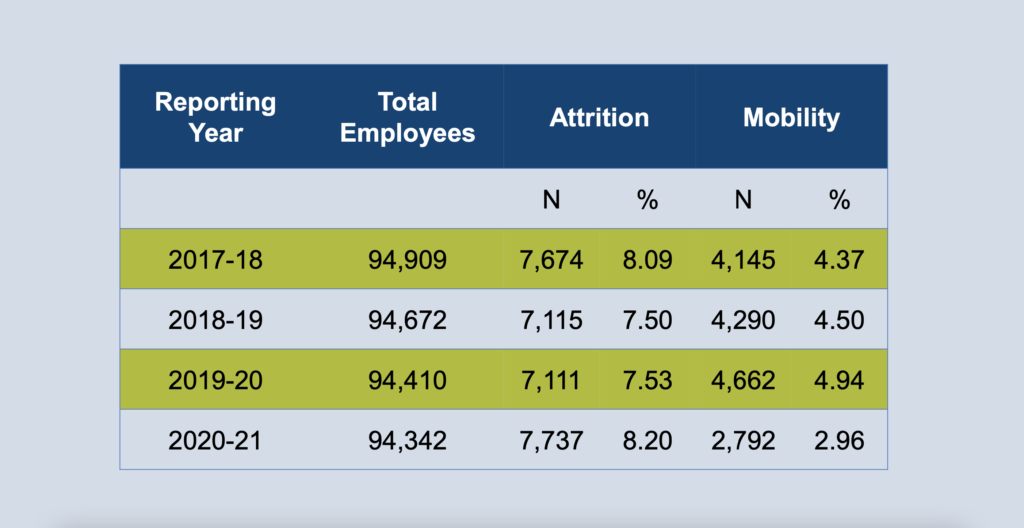
In the chart below, you can see the reasons given for teacher attrition. In 2020-21, the most common reason for leaving the profession was personal reasons (44.6%), followed by other reasons (25.5%), beyond control of the district (24%), and initiated by the district (5.9%). To find out more about these reasons, check out page 10 of the report.
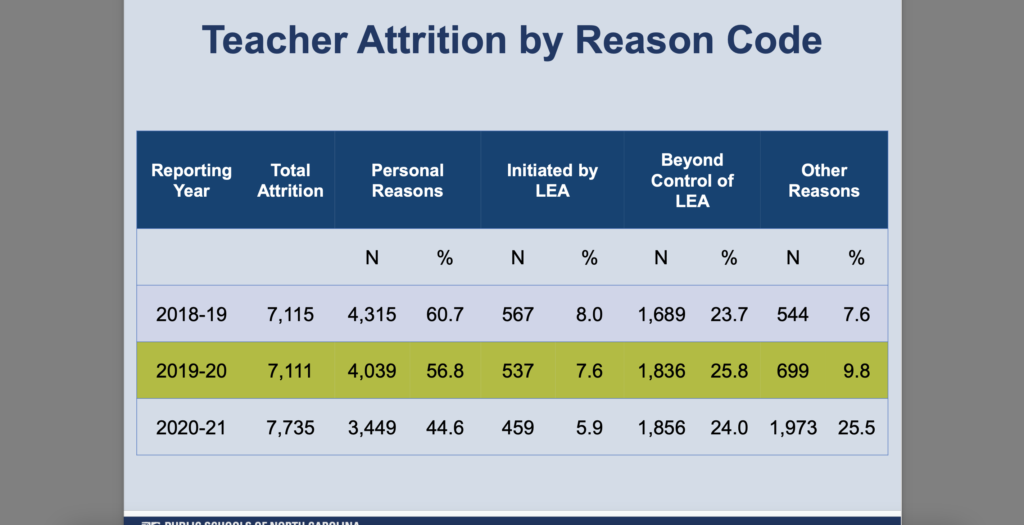
The press release from DPI describes the increase in teacher attrition this way:
“The 8.2% attrition rate for teachers during the 2020-21 school year did tick up from the previous year’s 7.53%, yet was only marginally higher than attrition rates during each of the three previous years beginning in 2017-18, when the attrition rate was 8.1%. “
Additionally, State Superintendent of Public Instruction Catherine Truitt remarked on the relative stability of the attrition rate in the press release.
“To be sure, attrition from the state’s teacher corps remains a concern and a challenge that we must address more aggressively,” Truitt said, “but the numbers for the 2020-21 school year show that the state didn’t see a big surge in teachers leaving the classroom, at least in the first 12 months of the pandemic. We’ll be assessing the impact of the second year of the pandemic when we’re able to analyze data from the 2021-22 school year.”
Truitt wrote a perspective on teacher attrition that you can read here.
Board Chair Eric Davis, however, looked to the future, which he anticipated would see a higher rate of teachers leaving the profession. In a press release, he said:
“While this data from last year may appear to be encouraging, current staffing shortages and a high likelihood of the Great Resignation hitting our schools at the end of this school year, should challenge us all to aggressively launch additional district and state level strategies to retain staff and fill vacancies before the next school year.”
District and school leaders from around the state have been remarking on the number of vacancies they are experiencing not only in the teaching profession but also in auxiliary staff positions, such as bus drivers. As WUNC’s Liz Schlemmer pointed out on Twitter, teacher vacancies increased significantly last year compared to the previous three years.
Patrick Miller, Superintendent of Greene County Schools and chair of the Professional Educator Preparation and Standards Commission, speculated that the discrepancy between attrition and vacancies in 2020-21 could be attributable to people deciding not to enter the teaching profession.
“You can’t be counted as leaving the profession if you have never entered in the first place,” he said.
DPI’s District Human Capital Director Tom Tomberlin said in an email that without further data it is impossible to say what was happening with vacancies in 2020-21.
“We don’t have the data to know if the current vacancy rates indicate a higher percentage of the total number of positions in the state,” he said in an emailed statement. “It is possible that LEAs are hiring more teachers with ESSER funds and the increased positions are raising vacancy rates.”
LEAs stands for Local Education Agencies, which is mostly another word for school districts. ESSER funds are federal funds given to states to help deal with the impact of COVID-19.
Here is the State of the Teaching Profession report.
Here is the presentation to the Board.
Pushback on Parent Advisory Commission
After announcing applications were open for a new Parent Advisory Commission on Feb. 23, Truitt received considerable pushback from Board members at this week’s meeting.
Each of the state’s education regions will be represented by six parents or guardians with the following makeup:
- Two from traditional public schools
- One from a charter school
- One from a homeschool
- One from a private school
- One “at-large public-school member from the largest county in each of the 8 regions, including: Buncombe, Catawba, Cumberland, Guilford, Mecklenburg, New Hanover, Pitt, Wake.”
Board member Jill Camnitz expressed “concern about the makeup” of the commission. Specifically, she questioned the wisdom of including two non-public school parents on a commission charged with commenting on public schools.
Truitt pointed out that the majority of the parents on the commission would be from public schools: two from traditional public schools, one from a charter school, and one at-large member who could come either from a charter or traditional public school.
But Vice Chair Alan Duncan said that when considering just representatives of traditional public schools, the make up of the commission only guaranteed a 33% representation. In contrast, 78% of the state’s students are traditional public school students, he said, so the make up of the commission won’t be representative.
Duncan mentioned that perhaps they could have hashed concerns out beforehand had the Board been consulted. He also said that neither DPI nor the Board have any “meaningful” authority over private or homeschooled students.
Truitt pushed back on that notion.
“First of all, this Board does many things and comments on many things over which it has no jurisdiction, so I don’t agree with that argument,” she said, adding that she was telling the Board about her commission only as a courtesy and had no obligation to consult them.
Duncan also brought up the fact that the same day Truitt announced the opening of the application period, her election campaign sent out an email mentioning the commission and asking for donations. He said he heard questions from some people as to whether receiving the campaign email may have given the recipients an advantage when it comes to applying for the commission.
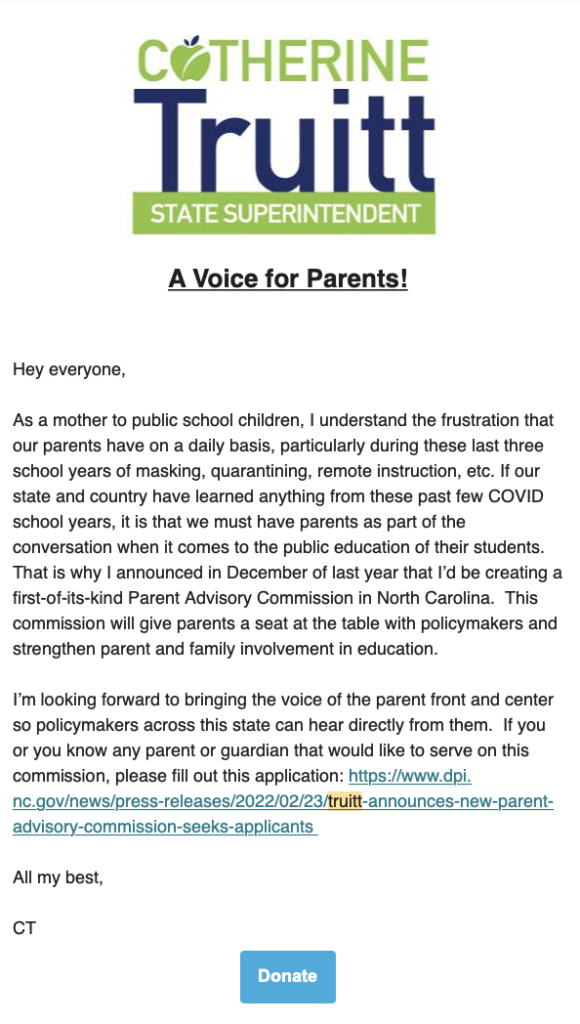
Truitt said that the email didn’t violate any laws or ethics standards and that it was “commonplace” for elected officials to send out emails on subjects related to their work that include a “donate” button.
As to whether receiving the email gave recipients an advantage, she said, “People can insinuate whatever they want about whether or not this is a pay-to-play opportunity.”
She said that if they don’t have proof, however, they shouldn’t make insinuations.
Board Member James Ford also questioned Truitt.
“My concern is about the inclusion of all parents, particularly those who are least likely to have a voice in the system,” he said, before questioning Truitt about the fact that part of the application asks for a recommendation from a public figure or educator.
“What is the virtue of that?” he asked.
He also asked her who will be selecting parents for the commission and what will they be basing their decisions on.
Truitt said that the application includes “specific questions” about parents’ views on public education and that the answers to those questions will ensure diversity. She said there will be geographic diversity, but that the application doesn’t ask for race or ethnicity.
As to the virtue of recommendations, Truitt said she wants to ensure that people applying are actually parents and that they want to be part of the commission “for the right reasons.”
She said decisions will be made by an internal committee at DPI made up of 10 people, of which she will be a part. She said she would share those names once they are decided.
Truitt said she was happy to address the worries of Board members once the process of building out the commission was further along, adding that their concerns were “premature.”
Kisha Clemons, the 2020 Principal of the Year and an advisor to the Board, said that having equity requires an intentional effort to include marginalized people. She said the lack of that effort in regards to the commission was “problematic.”
Truitt responded by saying that the application was sent to school district homeless liaisons and migrant liaisons, amongst others, and she reiterated that she would be happy to address the Board’s concerns when the commission process is further along.
COVID-19 updates
The Board heard an update on COVID-19, which included the fact that the state and country may finally be emerging from the most recent surge.
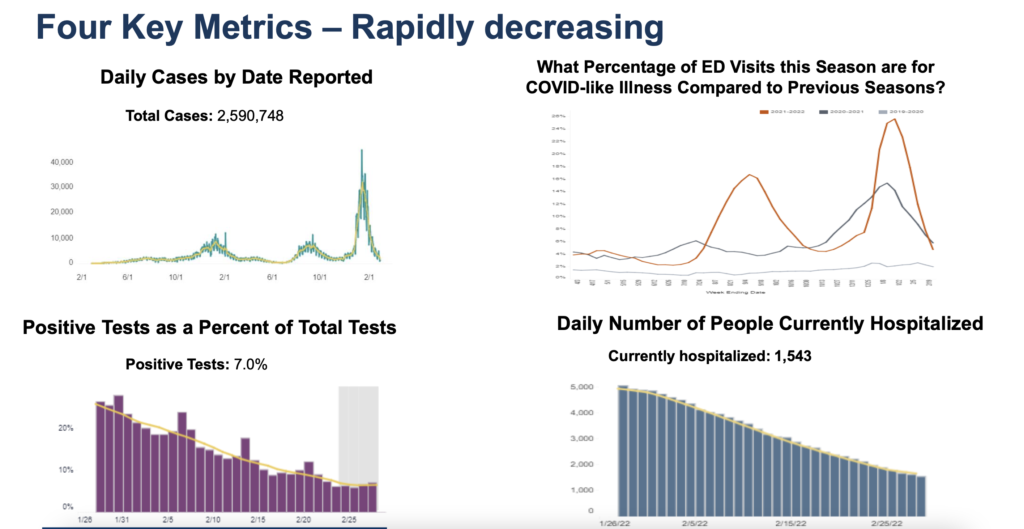
The presentation also included an update on mask recommendations, which stated that effective March 7th, the state’s Department of Health and Human Services (DHHS) no longer recommends universal mask requirements in schools, though students and staff should be supported if they want to wear one.
Gov. Roy Cooper recently encouraged school districts to lift their mask mandates but vetoed a bill from state lawmakers that would have allowed parents to opt their children out of wearing a mask even if there is a mandate in their district. It is expected that legislators will attempt to override the veto, but no action has been scheduled yet.
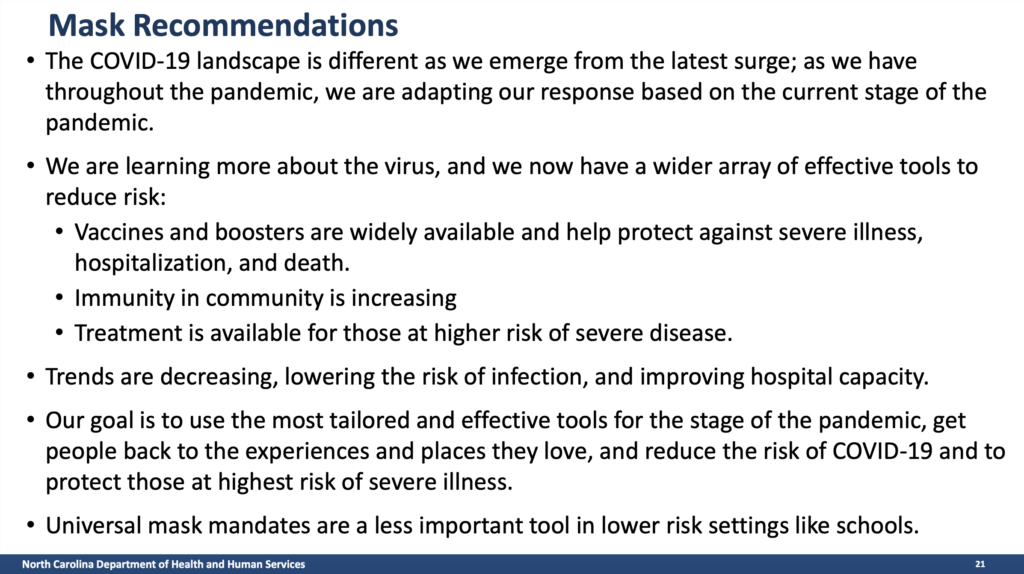
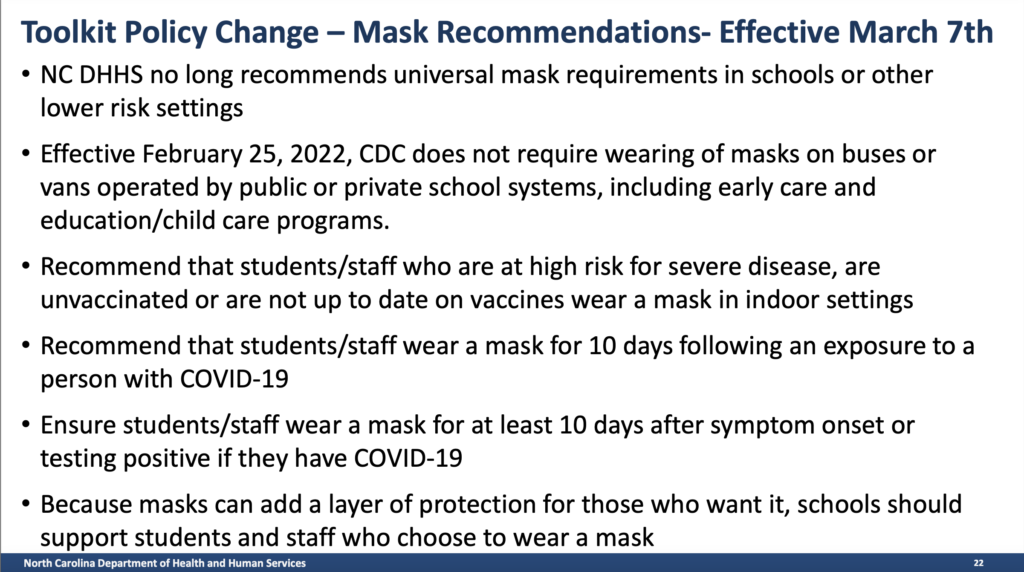
State Board staff position
Board Chair Eric Davis announced that Maria Pitre-Martin will be taking the role of Director of Board Operations and Policy. She is taking over for Deanna Townsend-Smith, who is leaving to become the Senior Director of the Dudley Flood Center for Educational Equity and Opportunity at the Public School Forum of North Carolina. Pitre-Martin formerly worked at DPI as Deputy Superintendent for District Support before leaving in 2019 to become Superintendent of Peterson City Schools in Virginia.
DRIVE Task Force
The task force to Develop a Representative and Inclusive Vision for Education (DRIVE) met on Monday, where it formally announced that Cooper signed Executive Order 243 — extending the life of the task force through Dec. 31, 2023.
The task force also announced the date for its second DRIVE Summit, which will be held June 17 at North Carolina A&T State University. The summit was originally slated for April, but the planning committee pushed it to the summer in hopes of engaging more K-12 teachers.
During Monday’s meeting, the task force heard a presentation from DPI’s District Human Capital Director Tom Tomberlin about the Human Capital Roundtable’s work. Tomberlin said he will present the roundtable’s recommendations to the Board in April, and the Professional Educator Preparation and Standards Commission will meet prior to that to finalize and approve its recommendations to the Board.
Editor’s Note: Patrick Miller serves on the board of EducationNC.
Recommended reading
